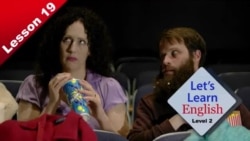Tóm lược (Summary)
Anna loves movies! And Pete has invited her to see one with him. But is that a good idea?
Anna rất thích xem phim! và Pete mời cô ấy đi xem một bộ phim cùng anh. Nhưng liệu đó có phải là ý kiến hay hay không?
Hội thoại (Conversation)
Anna: Hi, can you tell me how to get to your the movie theater?
(The person on the phone gives directions.)
Anna: Oh, that’s easy. OK, thank you. Bye.
(Anna meets Pete outside of the theater.)
Anna: Hi, Pete! Thanks for the movie invitation.
Pete: Yeah, sure Anna.
Anna: I love movies. I love the plot! I love the set design! I love the costumes! I love -
Pete: Anna, I take movies very seriously. You're not one of those people who talks during a movie, are you?
Anna: No.
Pete: Good.
Professor Bot: Anna loves movies. And..she loves talking about movies. And Pete doesn’t sound happy about that.
But he’s trying to be polite. He can do that with Indirect Questions.
We can ask a question directly: Where is your movie theater? or indirectly as Anna does:
Anna: Can you tell me how to get to your movie theater?
They have the same meaning. But indirect questions are more polite and a little more formal.
Many indirect questions begin with:
Can/Could you tell me…
Would/Do you mind…
Would it be possible…
or
Do you know…
Hmm, do you know if Anna will stop talking? I sure don’t.
Keep watching. And, this time look for indirect questions that begin with: Would you mind…
Anna: I love the smell of popcorn. I love seats that rock.
(Her chair makes noise as she rocks back and forth.)
Pete: I love when people are quiet.
(The lights go down and we see movie light on their faces.)
Anna: Ooh look, the previews are starting. I love to see what movies are coming out. Oh, this one looks good!
Pete: Anna, the previews are part of the movie experience. So, would you mind not talking?
Anna: Oh, sure, sure.
(Anna eats her popcorn loudly. Then, she begins drinking her milkshake loudly.)
Pete: Anna, I was wondering: are you almost finished with that?
Anna: No. There's still a lot of milkshake at the bottom.
(She drinks loudly again. And again.)
Pete: Anna, do you mind not drinking so loudly?
Anna: I'll try. But it's really thick.
(She moves the straw around and makes even more noise.)
Pete: Anna, what are you doing?!
(A person in the audience shushes Pete.)
Person in audience: Shh!
(Pete tells the person what was happening.)
Pete: I’m not the one making all the noise.
Person in audience: Shhh!
Anna: I’m done now.
(Anna now holds many noisy boxes of candy. Finally, she chooses a candy bar.)
Pete: Anna, would you mind opening that a little bit more quietly?
Anna: I'll try.
(She tries to open it quietly but cannot.)
Pete: Anna, just give it to me!
(He tears it open with his mouth. It makes a loud noise. Again, someone in the audience thinks he is making too much noise.)
Person in audience: Shhh!
Pete: (to the person) It's not mine. I'm opening it for her. Here.
Person in audience: Shhhhhh!!
(He gives the candy bar quickly back to her.)
Pete: Here!
Anna: Thanks, Pete.
Pete: Now, would you mind being more quiet?
(The light of someone’s phone shines in Pete’s face. He asks the person a question.)
Pete: Excuse me, would you mind turning down your phone light?
(Then, Anna’s phone rings.)
Anna: Oh, sorry! I forgot to turn my phone off.
(She tries to turn it off but drops it under the seat.)
Anna: Oh no! I dropped it. Where is it?
(She looks under the seat in front of her.)
Pete: Anna, can you please turn off your phone?
(She speaks to the person Pete just asked to turn their phone light down.)
Anna: Excuse me, would you mind lending me your phone light for a minute?
Pete: No! I’ll get it!
Person in audience: Shhhhh!
(People shush Pete again. He finally has had enough.)
Pete: Look, people, I’m not the noisy one here! So, you all need to shush the right person. And I should know about shushing! I shush people all the time!!
Security guard: Excuse me, sir. You can’t yell in a movie theater. Would you mind coming with me?
Pete: You're kicking me out? Me? But I’m always the quiet one in the movie!
(The security guard takes Pete out. Anna watches the movie and eats quietly from her bag of popcorn.)
Anna: Pete should know better. You have to be quiet in a movie theater. Shh, the movie’s starting!
Professor Bot: Well, that’s a surprise! I thought Anna would be the noisy one.
Well, she was … with her food. But Pete did all of the talking. At least he tried to be polite by using indirect questions.
Từ ngữ mới (New Words)
candy bar – n. a long, thin, sweet food, usually covered in chocolate
direct – adj. connected or related to something in a clear way
formal – adj. suitable for serious or official speech and writing
indirect – adj. not direct
invitation – n. a written or spoken request for someone to go somewhere or to do something
kick out – v. to force someone to leave a place
lend – v. to give something to someone to be used for a period of time and then returned
milkshake – n. a thick drink made of milk, a flavoring syrup, and often ice cream
plot – n. a series of events that form the story in a novel, movie, or live theater performance
polite – adj. having or showing good manners or respect for other people
popcorn – n. corn in the form of hard yellow seeds that burst open and become soft and white when they are heated
preview – n. a selected group of scenes that are shown to advertise a movie or television show
rock – v. to move someone or something back and forth or from side to side
seat – n. something, such as chair, that you sit on
set design – n. the creation of film, television or theatrical scenery.
shush – v. to tell someone to be quiet using the interjection “shh”
straw – n. a thin tube used for sucking up a drink
take (something) seriously – expression. to treat someone or something as being very important and deserving attention or respect
thick – adj. not flowing easily
turn down – v. to lower the volume, temperature or channel of something by pressing a button or moving a switch
turn off – v. to stop the operation or flow of (something) by pressing a button, moving a switch, etc.
Practice (Thực hành)
Now, you try it!
When you are in a new city or place, you may have many questions. For example, maybe you are visiting a museum, restaurant or some other place. You don't know how to find it. So, you ask someone a question. Then, when you arrive at the place, you have more questions.
Read about indirect questions below. Then, use the Comments section to practice making indirect questions!
Indirect Questions (Câu hỏi gián tiếp)
Direct questions are questions that we can ask family, friends, or other people with whom we are close.
Ex: “Where is the movie theater?”
Indirect questions are polite and a little more formal. We use them when we talk to strangers or people we are not close with and in work situations.
Ex: “Could you tell me where the movie theater is?”
Common indirect phrases:
Can/Could you tell me…
Would you mind…
Would it be possible
Is there any chance….
Do you know…
Do you have any idea...
Word Order
When we make indirect questions, the word order changes. Look carefully at the sentences below.
Direct: Why didn’t Penelope come?
Indirect: Can/could you tell me why Penelope didn’t come?
WRONG: Can/could you tell me why didn’t Penelope come?
Direct: Where is my phone?
Indirect: Do you know where my phone is?
WRONG: Do you know where is my phone?
Direct: Where is he?
Indirect: Would you mind telling me where he is?
WRONG: Would you mind telling me where is he?
Using do/does/did
For direct questions with do, does or did, this word is removed from the noun clause in the indirect question. (The noun clause in the first example below is "what time the meeting starts.")
Direct: What time does the meeting start?
Indirect: Do you have any idea what time the meeting starts?
WRONG: Do you have any idea what time does the meeting start?
Direct: Where do you want to sit?
Indirect: Can you tell me where you want to sit?
WRONG: Can you tell me where do you want to sit?
Using can/could
With some direct questions that begin with can or could, this word is removed from the indirect question.
Direct: Can/could I come to the movie?
Indirect: Would it be possible for me to come to the movie?
WRONG: Would it be possible can I come to the movie?
Direct: Can/could you share your popcorn?
Indirect: Would you mind sharing your popcorn?
WRONG: Would you mind can you share your popcorn?
“Yes or No” Questions
A “yes or no” question is a question whose expected answer is “yes” or “no.”
For "yes or no" direct questions without what, where, why, who, when and how, we use if or whether in the indirect question.
Direct: Does Anna take movies seriously?
Indirect: Do you know if Anna takes movies seriously?
Indirect: Do you know whether Anna takes movies seriously?
WRONG: Do you know does Anna take movies seriously?
Direct: Is this the right theater?
Indirect: Can you tell me if this is the right theater?
Indirect: Can you tell me whether this is the right theater?
WRONG: Can you tell me is this the right theater?
Direct: Has the movie ended?
Indirect: Do you have any idea if the movie has ended?
Indirect: Do you have any idea whether the movie has ended?
WRONG: Do you have any idea has the movie ended?
Bài kiểm tra Nghe (Listening Quiz)
See how well you understand this lesson by taking a listening quiz. Play each short video, then choose the best answer.
Tài liệu miễn phí (Free Materials)
Download the VOA Learning English Word Book for a dictionary of the words we use on this website.
Phần dành cho giáo viên (For Teachers)
Send us an email if you have comments on this course or questions.
Grammar focus: Indirect questions
Topics: Politely correcting someone's behavior; asking for something politely
Bình luận (Comments)
Now it's your turn. Send us an email or write to us on our Facebook page to let us know what you think of this lesson.












